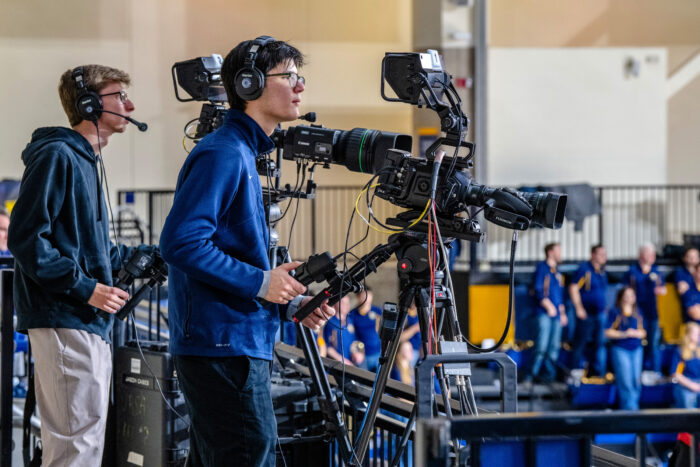In the months leading up to graduation, Chesnie Wardell finds herself in unfamiliar territory, applying for job after job, praying that her talents are recognized and the right company hires her fresh out of college. Many of her classmates are in the same situation. A year ago, the thought of the job application process seemed daunting, but last fall, Wardell took a chance on a class that she had never heard of before — a three-credit course called The Career Class.

“You think that all you’re going to talk about in a career class is your job, but no — it ends up going in the opposite direction,” Wardell says. “I thought, I’m learning more about yourself.”
The writing-intensive English course went through resume and cover letter building, preparation for going into the workforce, self-discovery, and how to work alongside people. But the concept that made this class stand out was that it also focused on Ignatian discernment and life goals.
“Part of discernment is trying to figure out what’s guiding me to make these decisions, and I think that was the hardest part,” says Wardell, a journalism major. “I had taken theology previously, but I don’t think it touched on discernment. I remember asking in class what discernment was and how do I make decisions. I realized there’s not one answer to that. There are many ways I make decisions with a discernment process.”

Dr. Liz Angeli is a professor of English in the Klingler College of Arts and Sciences, a spiritual director, and retreat leader through the Faber Center for Ignatian Spirituality at Marquette. Over the past few years, Angeli has become one of many faculty members who have integrated Ignatian discernment into courses they teach.
“I think discernment really is living contemplatives in action, and that’s what we’re called to do as a Jesuit institution,” Angeli says. “I was never exposed to discernment as an undergrad at Marquette. So, I started wondering, how can I bring in my spiritual direction skills into the classroom? How can we teach our students to listen to themselves and to other people, and that morphed into how can I create a class that’s like a retreat in 16 weeks?”
That’s how The Career Class started.
The course description reads:
“Managing your career requires managing uncertainty. The road ahead of you is unknown. The job you have after you graduate likely isn’t the job you’ll retire from. The job you retire from may not even exist yet. You might have opportunities not only to switch jobs and positions but to change careers that lead to a life you didn’t even know was imaginable.”
Essentially, it’s a writing class that helps students in the career formation process use elements of Ignatian spirituality to help them discern the best decisions for the future.
Angeli teaches this transformative course to undergraduate students, as well as graduate students in The Career Discernment Workshop course.
Gerry Canavan, chair and professor of English, has been Angeli’s colleague since 2016. He was in attendance when Angeli delivered a plenary address about her graduate career class at the MLA Leadership Institute, aimed at chairs and program directors in the changing higher education marketplace.
“Liz’s talk was on career formation and discernment, and how she uses the Ignatian pedagogical paradigm and spiritual practices to help students make decisions about what they want in life and how to work for it,” Canavan says. “I’ve been a participant in some of the workshops she does on campus, so I’ve seen firsthand how effective this can be — but it was great to see this material getting out to a wider audience and influencing thought leaders at a lot of different institutions at once.”
Canavan says that with an uncertain future, Ignatian discernment and formation courses are essential.
“Ignatian discernment helps you navigate that level of uncertainty by attuning yourself to your own talents, your own needs and your own desires; by thinking about consolation and desolation in the way St. Ignatius trained the Jesuits to do, we can help steer ourselves towards our own thriving,” Canavan explains. “As a framework for life it’s really useful, and I’ve seen in my own students how effective it can be.”
Wardell says her biggest takeaway from the class is that “you don’t have to settle but become comfortable with being uncomfortable.”
“You’re not going to always get what you want,” Wardell adds. “You have to compromise, but you don’t have to settle either. I think that was my big takeaway. If I could take this course again, I would. I’m a huge advocate because we all need it.”



